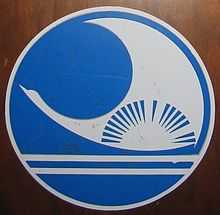Dongjak District
| Dongjak District 동작구 | |
|---|---|
| District | |
| 동작구 · 銅雀區 | |
 | |
 | |
| Country | South Korea |
| Region | Sudogwon |
| Special City | Seoul |
| Administrative dong | 17 |
| Government | |
| • Mayor | Chung-Sill Moon (Democratic United) |
| • Council | Dongjak District Council |
| • Members of the Seoul Metropolitan Council |
강희용 (Democratic United) 1st Electoral District 장환진 (Democratic United) 2nd Electoral District 박기열 (Democratic United) 3rd Electoral District 서영갑 (Democratic United) 4th Electoral District |
| • Members of the National Assembly |
Byung-Hun Jun (Democratic United) Dongjak-gu Gap district Mong Joon Chung (Saenuri) Dongjak-gu Eul district |
| Area | |
| • Total | 16.35 km2 (6.31 sq mi) |
| Population (2010[1]) | |
| • Total | 397,317 |
| • Density | 24,000/km2 (63,000/sq mi) |
| Time zone | Korea Standard Time (UTC+9) |
| Website | Dongjak-gu official website |
Dongjak District (Dongjak-gu) is one of the 25 gu which make up the city of Seoul, South Korea. Its name was derived from the Dongjaegi Naruteo Ferry, located on the Han River which borders the district to the north. It was the 17th gu created in Seoul, after being separated from Gwanak District on April 1, 1980.[2]
Symbols

The main symbol of Dongjak District is the Snowy Heron. A cartoon character named Roya, a baby snowy-heron, can be seen on signs, banners, and even light poles throughout the gu. According to the official website, use of the snowy heron is meant to symbolize the "clean, beautiful and noble spirit" of Dongjak's people. The emblem, found at most official buildings, depicts the snowy heron soaring into the sky.
Economy
Dongjak is home to some KOSPI200 companies, including Nongshim, Honam Petrochemical, and Yuhan.
Administrative divisions
Dongjak District is divided into 14 dong, which are:
|
Education
Dongjak District is home to Chongshin University, the Seoul campus of Chung-Ang University, and Soongsil University.
Places of interest
There are many notable sights in Dongjak District. The most famous is the National Cemetery, located in Dongjak-dong. Additionally, several temples are located throughout the ward. The Noryangjin Fish Market is also notable, as almost half of the fish brought to the city comes through here.
Boramae Park is a large park that was used as an airfield during the Korean War. It now has several decommissioned aircraft on display. The park also has a large jogging track, workout equipment, a rock climbing wall, skate park, basketball courts, badminton courts, tennis courts, playgrounds, and Boramae Buddhist Temple. A Buy-the-Way sits in the center of the park. Built in 2002, the Boramae Chereville is the 14th tallest building in Seoul and stands on the edge of Boramae park.
Transportation
Railways
- (Yeongdeungpo-gu) ← Daebang — Noryangjin → (Yongsan-gu)
- Seoul Subway Line 2 Circle Line
- (Seocho-gu) ← Sadang → (Gwanak-gu) ← Sindaebang → (Guro-gu)
- (Yongsan-gu) ← Dongjak — Isu — Sadang Station → (Seocho-gu)
- (Seocho-gu) ← Isu — Namseong — Soongsil University — Sangdo — Jangseungbaegi — Sindaebangsamgeori → (Yeongdeungpo-gu)
- Seoul Metro Line 9 Corporation
- (Yeongdeungpo-gu) ← Noryangjin — Nodeul — Heukseok — Dongjak → (Seocho-gu)
Sister cities
References
- ↑ Korean Statistical Information Service (Korean) > Population and Household > Census Result (2010) > Population by Administrative district, Sex and Age / Alien by Administrative district and Sex, Retrieved 2010-06-02.
- ↑ "동작구 (Dongjak-gu 銅雀區)" (in Korean). Doosan Encyclopedia. Retrieved 2008-04-17.
External links
| Wikimedia Commons has media related to Dongjak-gu, Seoul. |
| ||||||||||
Coordinates: 37°30′44.65″N 126°56′21.31″E / 37.5124028°N 126.9392528°E


